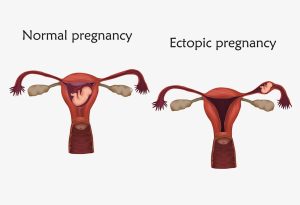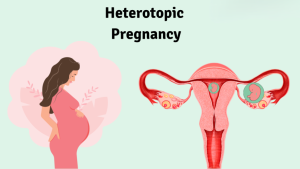Many people are familiar with ectopic pregnancy; but a condition known as heterotopic pregnancy is very rare. Indeed, according to the National Institutes of Health, in natural conception cycles, heterotopic pregnancy is a rare event, occurring less than one in 30,000 pregnancies.
SONIA OKERE presents the story of heterotopic pregnancy survivor, Ijeoma Okeyobasi
The Okeyobasis were extremely happy when the wife, Ijeoma, was first diagnosed as pregnant with twins. But just as she and her husband began to make preparations for the pregnancy journey and counting down to the day they will meet their twins in person, the unthinkable happened!
Recounting her experience on Facebook, Ijeoma shared how she almost lost her life while pregnant. She narrates:
 “Sometime in 2015, I found out I was pregnant with twins. The joy I and my husband had was out of this world. We even named our twins cute names for boys.
“Sometime in 2015, I found out I was pregnant with twins. The joy I and my husband had was out of this world. We even named our twins cute names for boys.
“I was living my best life until I started noticing sharp pains around my ribs. I immediately went to the hospital. After the ultrasound, the doctors found a healthy foetus. For the pain, he prescribed some painkillers and progesterone injections, which I started immediately.
“However, the pain grew worse. It was so bad that one time I had to stop my car in the middle of the road. It took the intervention of some commuters to pull me out of the major road. Sadly, each time I visited the hospital, an ultrasound was done, but they couldn’t detect why I was experiencing unbearable pain.
“When the pregnancy was nine weeks old, one night I slumped in the bathroom, and that was when the other foetus, which was outside the womb, ruptured and I started bleeding. Thank God, my husband was around, and he quickly rushed to stabilise me.
“When I regained consciousness, I told him to take me to a particular hospital that was different from the one I had been attending. When we got there, they did an ultrasound and sent me for a trans-vaginal scan, and that was when I was diagnosed with heterotopic pregnancy.”
Heterotopic pregnancy explained
Heterotopic pregnancy is explained as “the existence of two simultaneous pregnancies with separate implantation sites.”
“One pregnancy is a viable intrauterine pregnancy (occurring in the uterus) and the other of which is a non-viable ectopic pregnancy (occurring outside of the uterus, usually in a fallopian tube),” experts at online platform, Verywell Family, say.
They add that this type of pregnancy can be very dangerous and is made all the more difficult by the fact that most parents wish to keep the viable pregnancy while having to terminate the other.
 Incidence and risk factors
Incidence and risk factors
Experts say this type of pregnancy is rare in natural conceptions, with an estimated incidence of one in 30,000 pregnancies. However, due to the advancement of infertility treatment, there has also been a rise in the occurrence of multiple, ectopic, and heterotopic pregnancies.
According the American College of Obstetricians and Gynaecologists (ACOG), the incidence of heterotopic pregnancies has risen to one in 1,000 pregnancies among women who conceive using assisted reproductive technology such as in vitro fertilization (IVF).
The researchers also reported that although the fallopian tube is the most common site for ectopic gestation, there have been cases of cervical and ovarian heterotopic pregnancies. They warn that this type of pregnancy poses significant risks and challenges for both the mother and the foetus.
Regarding the risk factors, various scientific studies have identified some factors that can increase the chances of developing heterotopic pregnancy. They include:
- Assisted reproductive technology (ART)
- Previous tubal surgery or damage
- History of ectopic pregnancy
- Fertility issues
- Multiple pregnancies
- Advanced maternal age (over 35 years)
- Smoking
- History of pelvic surgery
- Uterine abnormalities in shape or structure
- Family history of heterotopic or ectopic pregnancy
Ijeoma’s story continues
Continuing her story, Ijeoma added, “They also discovered that it was the foetus outside the womb that ruptured.
“Surgery was carried out immediately, and, according to the doctor, if the foetus had ruptured inside my fallopian tube, it would have been very fatal.
I am grateful to God that I survived -Ijeoma
“Unfortunately, I also lost the other twin, but I am grateful to God that I survived. Today I have three other children.”
General symptoms of heterotopic pregnancies
Experts at the Mayo Clinic counselled pregnant women to seek immediate medical help if they are experiencing the following symptoms:
Abdominal or pelvic pain
This pain is often sharp or stabbing and may be localised to one side of the abdomen. It can be caused by the ectopic pregnancy stretching or irritating surrounding tissues.
Vaginal bleeding
This may vary from light spotting to heavier bleeding. This occurs when the ectopic pregnancy leads to bleeding in the pelvic area or when the uterus starts to contract.
Shoulder pain
This symptom is caused by internal bleeding that irritates the diaphragm and requires immediate medical attention.
Nausea and vomiting
These symptoms can arise from hormonal changes or the physical stress of the pregnancy, similar to what is experienced in early pregnancy or ectopic pregnancies.
Dizziness or fainting
These can occur due to significant blood loss or internal bleeding, leading to a drop in blood pressure. This is a serious symptom that requires urgent care.
Shock
This includes a rapid heartbeat, low blood pressure, and pale skin. Shock indicates severe internal bleeding and can be life-threatening.
How heterotopic pregnancy is diagnosed
Experts say recognising symptoms of heterotopic pregnancy early is crucial for effective diagnosis and treatment. Online platform, Patient Safety Network, explains that heterotopic pregnancy is often detected between six and 10 weeks of gestation.
However, the probability of a misdiagnosis is about 50% to 80% in most cases, and that is due to the following factors:
• The symptoms of this condition closely resemble those of a normal pregnancy or other complications, making it difficult to identify.
• Standard ultrasound may not always detect an ectopic pregnancy, particularly in the early stages or when the focus is primarily on the intrauterine foetus.
• Healthcare providers might not consider heterotopic pregnancy, especially in women without a history of assisted reproductive technologies.
Life-threatening condition
According to the Cleveland Clinic, heterotopic pregnancy is usually life-threatening, and the choice of treatment depends on factors such as the patient’s overall health, the gestational age of the pregnancies, and the specifics of the heterotopic pregnancy.
They note that after a proper diagnosis, the ectopic pregnancy can be terminated while preserving the intrauterine pregnancy.
Conclusion
Heterotopic pregnancy is a rare but serious condition that requires heightened awareness, especially with the increasing use of assisted reproductive technologies.
Experts therefore advise women to present immediately in the hospital once they suspect they are pregnant. That way, the health of the expectant mother and her unborn baby will be under competent supervision until delivery or for medical intervention as necessary.


